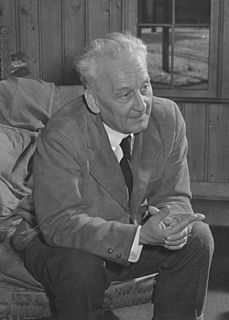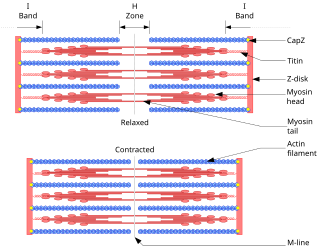
Albert Szent-Györgyi de Nagyrápolt was a Hungarian biochemist who won the Nobel Prize in Physiology or Medicine in 1937. He is credited with first isolating vitamin C and discovering the components and reactions of the citric acid cycle. He was also active in the Hungarian Resistance during World War II and entered Hungarian politics after the war.

Albert Szent-Györgyi Medical University was originally established in Kolozsvár, then in Austria-Hungary, later Romania, in 1872. After World War I, it was moved to Szeged. Since 1921 great advances have been made in the development of the University. Most of the University buildings have preserved their original, harmonized style, providing a true University atmosphere of tradition.

Charles Glen King was an American biochemist who was a pioneer in the field of nutrition research and who isolated vitamin C at the same time as Albert Szent-Györgyi. A biography of King states that many feel he deserves equal credit with Szent-Györgyi for the discovery of this vitamin.
Tak Wah Mak, is a Canadian medical researcher, geneticist, oncologist, and biochemist. He first became widely known for his discovery of the T-cell receptor in 1983 and pioneering work in the genetics of immunology. In 1995, Mak published a landmark paper on the discovery of the function of the immune checkpoint protein CTLA-4, thus opening the path for immunotherapy/checkpoint inhibitors as a means of cancer treatment. Mak is also the founder of Agios Pharmaceuticals, whose lead compound, IDHIFA®, was approved by the FDA for acute myeloid leukemia in August 2017, becoming the first drug specifically targeting cancer metabolism to be used for cancer treatment. He has worked in a variety of areas including biochemistry, immunology, and cancer genetics.
Fox Chase Cancer Center is a National Cancer Institute-designated Comprehensive Cancer Center research facility and hospital located in the Fox Chase section of Philadelphia, Pennsylvania, United States. The main facilities of the center are located on property adjoining Burholme Park. The center is part of the Temple University Health System (TUHS) and specializes in the treatment and prevention of cancer.

Steven A. Rosenberg is an American cancer researcher and surgeon, chief of Surgery at the National Cancer Institute in Bethesda, Maryland and a Professor of Surgery at the Uniformed Services University of Health Sciences and the George Washington University School of Medicine and Health Sciences. He pioneered the development of immunotherapy that has resulted in the first effective immunotherapies and the development of gene therapy. He is the first researcher to successfully insert foreign genes into humans.

Chen Zhu is a Chinese hematologist, molecular biologist, and politician. He is chairman of the Chinese Peasants' and Workers' Democratic Party, a vice-chairman of the Standing Committee of the National People's Congress, and President of the Red Cross Society of China. He formerly served as China's Minister of Health. Chen also holds a professorship at the School of Medicine of Shanghai Jiao Tong University.
The Damon Runyon Cancer Research Foundation is an American not-for-profit cancer research organization focused on "discovering the talent to discover the cure". The organization states that its goals are to: "identify the best and brightest early career scientists in cancer research, accelerate the translation of scientific discoveries into new diagnostic tools and treatments, and to enable risk-taking on bold new ideas".

Beatrice Mintz was an American embryologist who contributed to the understanding of genetic modification, cellular differentiation, and cancer, particularly melanoma. Mintz was a pioneer of genetic engineering techniques and was among the first scientists to generate both chimeric and transgenic mammals.
Frederick W. Alt is an American geneticist. He is a member of the Immunology section of the National Academy of Sciences and a Charles A. Janeway Professor of Pediatrics, and Professor of Genetics at Harvard Medical School. He is the Director of the Program in Cellular and Molecular Medicine at the Boston Children's Hospital. He is a Howard Hughes Medical Institute investigator, since 1987.

James Patrick Allison is an American immunologist and Nobel laureate who holds the position of professor and chair of immunology and executive director of immunotherapy platform at the MD Anderson Cancer Center at the University of Texas.

The Szent-Györgyi Prize for Progress in Cancer Research, established by National Foundation for Cancer Research (NFCR) and named in honor of Albert Szent-Györgyi, Nobel Laureate and co-founder of NFCR, has been awarded annually since 2006 to outstanding researchers whose scientific achievements have expanded the understanding of cancer and whose vision has moved cancer research in new directions. The Szent-Györgyi Prize honors researchers whose discoveries have made possible new approaches to preventing, diagnosing and/or treating cancer. The Prize recipient is honored at a formal dinner and award ceremony and receives a $25,000 cash prize. In addition, the recipient leads the next "Szent-Györgyi Prize Committee" as honorary chairman.

Michael Nip Hall is an American-Swiss molecular biologist and professor at the Biozentrum University of Basel, Switzerland.
Susan Band Horwitz is an American biochemist and professor at the Albert Einstein College of Medicine where she holds the Falkenstein chair in Cancer Research as well as co-chair of the department of Molecular Pharmacology.

The sliding filament theory explains the mechanism of muscle contraction based on muscle proteins that slide past each other to generate movement. According to the sliding filament theory, the myosin of muscle fibers slide past the actin during muscle contraction, while the two groups of filaments remain at relatively constant length.

Douglas R. Lowy is the Acting Director and Principal Deputy Director of the U.S. National Cancer Institute (NCI) and Chief of the Laboratory of Cellular Oncology within the Center for Cancer Research at NCI. Lowy served as Acting Director of NCI between April 2015 and October 2017 following the resignation of Harold E. Varmus, M.D., and again between April and November 2019, while Director Norman Sharpless served as the Acting Commissioner of the U.S. Food and Drug Administration. He resumed the role of Acting Director on May 1, 2022, when Sharpless stepped down. Lowy has served as Deputy Director of the NCI since 2010, alongside former directors Varmus and Sharpless. Lowy was co-recipient of the National Medal of Technology and Innovation in 2014 and the Lasker-DeBakey Clinical Medical Research Award in 2017.

Mark Morris Davis ForMemRS is director and Avery Family Professor of Immunology in the Institute for Immunity, Transplantation and Infection at Stanford University.
Webster K. "Web" Cavenee is the Director of Strategic Alliances in Central Nervous System Cancers at the Ludwig Institute for Cancer Research and Distinguished Professor at the University of California, San Diego. He was the Director of the Ludwig Institute for Cancer Research until 2015 when it was taken over by Richard Kolodner. His laboratory studies gene mutations in cancer, most notably in EGFR and glioblastoma multiforme.
Kornelia Polyak is a professor of medicine at Harvard Medical School and an internationally recognized breast cancer expert.

Ilona Banga (1906–1998) was a Hungarian biochemist known for co-discovering actomyosin and working to characterize how actin and myosin interact to produce muscle contraction. She and her husband József Mátyás Baló discovered the first elastase – an enzyme capable of degrading the protein elastin which gives tissues like veins their flexibility. She also contributed to work that earned Albert Szent-Györgyi the Nobel Prize in Physiology or Medicine in 1937, including by developing methods for the purification and characterization of large quantities of vitamin C. During World War II she saved the equipment of the Institute of Chemistry of the University of Szeged.











